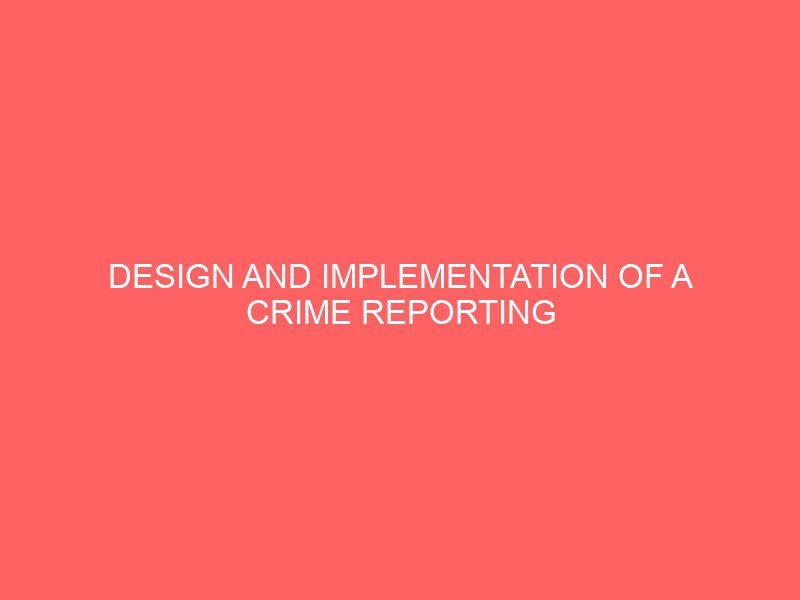Description
CHAPTER ONE
Introduction
1.1 Background of Study
This research work is on Design and implementation of a crime reporting system for Enugu state government (a study of state C.I.D Headquarters, Enugu). The quest to control crime and breakdown of law and order increases has the society grows and diversity of human intentions and interactions abound. An ideal society is governed by laws and regulations that are collectively agreed upon and measurable consequences that will be meted out for any member of the society that is found culpable to have floated any specific component of the legal infrastructure.
Besides the legal infrastructure in a society are the security apparatuses that enforce the law with the interest to maintain law and order. The legal infrastructures determine the extent to which law enforcement agents can act or protect the common interests of individuals in the society. It also outlines the civic responsibilities and human rights for the members of the society.
Customarily, members of the society are supposed to report any incidence of breakdown of law and order to the appropriate civil and military security apparatuses. Reported cases are also supposed to be intelligently collected, evaluated and investigated to a more conclusive and justifiable end. Evidences are collected, protected and properly examined before accused persons are charged to Law court and fairly prosecuted. Investigations are carried out without fear or favour. In fact, any attempt to prevent due process during crime investigation is in itself a crime
and it is also punishable under the law.
Until recently, the process of reporting and investigating crimes in the society has been mainly manual. Individuals who have some complaints will work into any offices of the security agents (e.g. Police, neighborhood corps) to inform and write in statement issues that may need their attention. At these offices, the security agents will raise an incidence form and ask the reporter to fill some appropriate segments. The security agents will also ask some intelligent questions from the reporter and make notes of preliminary investigations. Evidences suggested will be noted and further investigations will be followed up and new evidences will be collected, evaluated and protected.
The advent of technology has opened new fronts of opportunities of leveraging on the diverse benefits of information technology to crime reporting. There are various technology platforms that have been developed to assist how crime incidences are reported, responded to and
investigated. The technological applications have gone from telegraph, special radio
communication, and dedicated phone lines to a more responsive and more pervasive
technological application platforms (web and mobile software applications). Majority of the
members of the society nowadays have mobile devices that can easily access the internet. This
makes the web approach the most economical and open approach for reporting crime with a far
reaching benefits and coverage. Although there are several efforts that have been made in this
area around the world, there is still no popular and responsive platform for reporting crime in
Nigeria. The few available platforms in Nigeria (e.g. Amebo, Linda Ikeji) are blogs and are not
ultimately serving the goal of properly reporting, evaluating and investigating various crimes in
Nigeria. A close thing to it is the respective platforms sponsored by Economic Financial Crime
Commission (EFFC) and Investigation of Crime and Corrupt practices (ICPC); they provide
avenues to report crime incidences but investigation and response are towards financial crimes.
This platform does not include murder, battery or harassment incidences which are commonly
reported at the local Police station than financial crimes reported at EFFC and ICPC combined.
These institutions and their respective platforms are specialized in the area of financial crime and
their activities are so secretive that processes and progress of investigations are not shared with
other security agencies and the members of the public.
The available platforms are far below how technology could be harnessed to report crimes. The
platforms are not popular and not very intuitive to use by common citizens. The platforms are
unidirectional in the sense they do not have feedback for the members of the society. All these
gaps have necessitated our interests for an ideal application that will address the limitations.
We are looking forward to developing an all-encompassing web platform that reports all manners
of crimes, open to all members of the public, suggestive (search for entities), interpretative and
enlightening. The platform will provide a platform for various security agencies to share and
gather evidences and mobilize members of the public for certain interests that will drive better
policing, crime prevention and investigation.
We hope this project will address the gaps identified in the information space of crime reporting
and investigation in Nigeria.
1.2 Statement of Problem
The notable crime reporting platforms are lopsided and not intuitive. The process of reporting
crimes to security agencies still remain very difficult. The platforms are also unidirectional in the
sense that they do not have feedbacks for the members of the society. The existing platforms do
not support sharing of relevant information with other security agencies, thereby because owners
of these platforms wants to take all the praise; while in actual fact security is being reinforced
when meaningful and relevant information is shared among security stakeholders towards
offering an excellent service. All these make our justice system questionable and irresponsible.
We propose an all-encompassing platform that will practically address ego issues among security
agencies, give feedbacks and strengthen the overall security service and existing security
apparatuses.
1.3 Aims and Objectives of Study
To develop a web application that demonstrates that the process of reporting, evaluating and
investigating crimes in Nigeria should not be tortuous and that the model can be adopted for
designing newer crime reporting platforms.
Our objective is to propose a system that caters for reporting all kinds of crimes, gives feedback
and sustain the process of crime investigation and correction.
1.4 Scope of Work
I will design a web application that will provide a platform to report all manners of crimes. I will also provide a platform for different security agencies and their representatives to be
registered; with a dashboard to view and interpret different report incidences. The general public
will also be able to freely report, get feedback and evaluate progress of reported cases without
fear or intimidation. The application will be data driven and user experience will be responsive
and consistent.
The applications will be accessible over the internet on computers and other mobile devices. No
other hardware resources will be required and the evaluation will be mainly experimental.
1.5 Project Development Methodology (Agile Software Methodology)
Agile-Scrum Software Model
Agile software methodology is a set of repetitive and incremental process models. It is
considered to be most flexible and easily maneuverable for skittish requirement specifications
environments. Unlike other process models where high formality is required and the
specifications are expected to be known and verified before the commencement of design, Agile
models allow the use of increments or possible prototypes that can evolve into a more suited and
validated requirements and eventually software application. Pressman (2004) defines it as a
development pattern that encourages customer satisfaction and early incremental delivery of
operational software; small, highly motivated project teams; informal methods; minimal software
engineering work products; and overall development simplicity.
There are several evolving Agile process models for different design scenarios which are
considered flexible, incremental and repetitive in approach. For this project, we would be using
SCRUM Agile process model because of its support for object oriented software design.
Pressman (2004) noted that Agile process models are not completely independent of the
traditional process models; in fact most of the Agile models are flexible derivations or variations
of the traditional approach.
SCRUM Process Model
It is an Agile process model which follows these activities: requirements, analysis, design,
evolution and delivery. Scrum emphasizes the use of a set of software process patterns that have
been proven effective for projects with tight timelines, changing requirements and business
criticality. A prioritized list of project requirements or features that provide business value for the customer is made and it’s called Backlog, work units that are required to achieve a requirement defined in the backlog that must be fit into a predefined time-box are also made and it’s called Sprints. Short meetings held daily by the scrum team would also be conducted, a team leader also called the scrum master who leads the meeting and assesses the responses from each
person. Demos are also done; which is a software increment to the customers so that
functionality that has been implemented can be demonstrated and evaluated by the customer.
1.6 Motivation
The new campaign aimed at fighting corruption and sharp practices in Nigeria has been our
motivation. We want to demonstrate an ideal model that can be adopted to assist crime reporting
and create a healthy thinking and attitudes among Nigerians.








Reviews
There are no reviews yet.